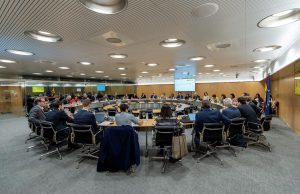Artificial Intelligence and Smart Data, the keys to controlling real estate risk in investment and financing in the financial sector.
Veltis Rating, TECNALIA, Grupo Lar and Grupo Tecnícua held the colloquium 'How to identify and control real estate risk in investment and financing' on 9 April in Madrid. An event that focused on Artificial Intelligence and Smart data, two elements that are indispensable in reducing financial risks in the real estate sector.
During the event, three round tables were held, divided into different themes. Our colleague Mª Paz Navarro, Head of Regulation, Interbank Services and Cooperation Projects at CECA, participated in the round table discussion addressing climate risks and their impact on banking, moderated by Efrén Feliú, Head of Adaptation to Climate Change at TECNALIA.
The roundtable that discussed the importance of climate risk in the financial sector featured the following experts from the financial sector:
- Juan Carlos Delrieu, Head of the Office of the Chair and Director of Strategy and Analysis of the Spanish Banking Association.
- Mª Paz Navarro, Head of Regulation, Interbank Services and Cooperation Projects at CECA.
- Mónica Prado, Head of Risk and Sustainability Policies at Kutxabank.
Mª Paz Navarro, Head of Regulation, Interbank Services and Cooperation Projects at CECA, stated that CECA's goals are aligned with ESG criteria: 'CECA and its member entities maintain a strong commitment to sustainable finance, which is reflected in our ESG cooperation projects, with which we seek to provide an effective and unified response, in coordination with regulators and supervisors, to the methodological challenges posed by the implementation of regulation and best practices'.
Furthermore, she stressed the need for collaboration between the different stakeholders involved to ensure compliance with the common goals of the 2030 Agenda: 'In order to ensure the effective implementation of sustainability, public-private collaboration and the development of a roadmap of regulatory and supervisory requirements are necessary so that entities can shift from tactical to strategic actions to meet the 2030 Agenda'.













